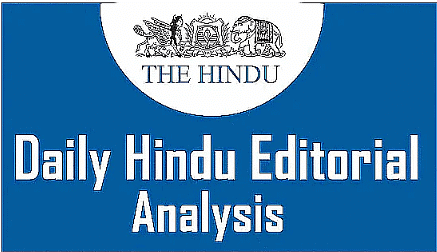UPSC Exam > UPSC Notes > Current Affairs & Hindu Analysis: Daily, Weekly & Monthly > The Hindu Editorial Analysis- 20th July 2023
The Hindu Editorial Analysis- 20th July 2023 | Current Affairs & Hindu Analysis: Daily, Weekly & Monthly - UPSC PDF Download

More than court action, revisit the Indus Waters Treaty
Why in News?
The Indus Waters Treaty (1960), or IWT, that regulates the Indus water courses between the two riparian states of India and Pakistan, is cited by many as an example of cooperation between two unfriendly neighbours for many reasons. These include the IWT having survived several wars and phases of bitter relations, and its laying down of detailed procedures and criteria for dispute resolution.
- But in the last decade, exercising judicial recourse to settle the competing claims and objections arising out of the construction and design elements of the run-of-river hydroelectric projects that India is permitted under the IWT to construct on the tributaries of the Indus, Jhelum and Chenab before these rivers flow into Pakistan, has increased.
What is the Indus Water Treaty?
- In 1960, India and Pakistan signed the Indus Waters Treaty with the World Bank as a signatory of the pact.
- Under the treaty, India got control over the three eastern rivers Beas, Ravi, and Sutlej while Pakistan got control of the western rivers Indus, Jhelum, and the Chenab.
- According to the treaty, India has the right to generate hydroelectricity through the run-of-the-river (RoR) projects on the western rivers which, are subject to specific criteria for design and operation.
Dispute Resolution Process
- According to Article IX of the treaty that deals with the “Settlement of Differences and Disputes”, there are three possible steps to decide on objections raised by either side.
- Working within the “Permanent Indus Commission” (PIC) of the Indian and Pakistani delegation of water experts that meet regularly.
- Consulting a World Bank-appointed neutral expert.
- Setting up a court process to adjudicate the case through the World Bank and the Permanent Court of Arbitrage (PCA).
Problem with Hydroelectric Projects
- Pakistan has objected to the two hydroelectric power projects (HEPs) :
- The 330 MW Kishenganga HEP on the Kishenganga river, a tributary of the river Jhelum.
- The 850 MW Ratle HEP on the Chenab river.
- Both India and Pakistan differed on whether the technical details of the hydel projects conformed with the treaty, given that the Jhelum and Chenab were part of the “western tributaries”.
Timeline of the dispute between the two nations
- In the following year in 2016, Pakistan unilaterally retracted this request and proposed that a Court of Arbitration should adjudicate its objections.
- Instead of responding to Pakistan’s request for a Court of Arbitration, India moved a separate application asking for the appointment of a Neutral Expert, which is a lower level of dispute resolution provided in the Treaty.
- On March 31, 2022, the World Bank decided to resume the process of appointing a Neutral Expert and a Chairman for the Court of Arbitration.
Criticism of the Indus Water Treaty
- The treaty is internationally recognized as one of the most successful cross-boundary water dispute treaties but during the past three decades, its implementation has been disregarded.
- The regular use of state-sponsored terrorism has led to the suspension of bi-annual dialogue between the Indus treaty commissioners, which resumed the next year.
- The provisions of the treaty are highly technical in nature, leading to different far-ranging interpretations.
Way Forward
- The two nations have to sit together and resolve the apprehensions with regard to the IWT rather than going to International forums.
- The technical provisions need to be updated with the current realities and concerns of both nations.
The document The Hindu Editorial Analysis- 20th July 2023 | Current Affairs & Hindu Analysis: Daily, Weekly & Monthly - UPSC is a part of the UPSC Course Current Affairs & Hindu Analysis: Daily, Weekly & Monthly.
All you need of UPSC at this link: UPSC
|
38 videos|5293 docs|1118 tests
|
Related Searches
















